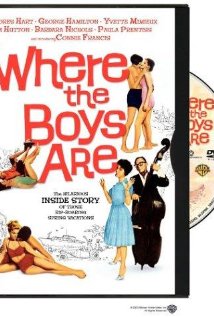
WHERE THE BOYS ARE
US, 1960, 99 minutes, Colour.
Dolores Hart, Connie Francis, Paula Prentiss, George Hamilton, Jim Hutton.
Directed by Henry Levin.
Where the Boys Are is one of those typical MGM musicals of the sixties, aimed at the youth audience. This one is a bit better than usual. It reflects the times and may seem dated now. However, it has a light breezy touch, especially in the personality of the stars. It is certiainly a take it or leave it musical, remade in 1984.
1. A successful a comedy drama? Target audience? Conventions of comedy, well-used?
2. The 1960s setting, changes since then, younger people? Styles, meaning of life? Despite the surface changes, real change?
3. A comedy of manners? Picture of American life-style? The manners all US college youth in the 1960s? The importance of the police warning to the younger officers?
4. The picture of pre-Vietnam American youth? Post-Vietnam? youth? The changes and why?
5. The customs and mores about behaviour and sex, the 1960s, later? Outspokenness, the fact of more words than action?
6. How much satire on the young students? How much was realistic? Realistic story or contriving to show various incidents in a compressed time?
7. The contrast between Fort Lauderdale’s weather and the snow? The class atmosphere, Merritt talking freely in class, interview with the Head, the reality of life and the holiday?
8. The phenomenon of subculture of students at Fort Lauderdale?
9. The importance of the car-ride, picking up the stranger, paying for rooms, budgeting, going for swims? How interestingly and attractively was this portrayed?
10. The title, illustrated at Fort Lauderdale? Friendship, relationships between boys and girls? Pros and cons?
11. How real was the story of Melanie and the boys, credible? The influence of Merrit’s talk? Her being alone, wanting to love, the melodrama of her wandering the town?
12. How entertaining was Tuggall? How real, ironic? How genuine for laughs? The TV matching her comic character? The importance of the Lola interlude and the realisation of love? How optimistic the relationship?
13. The comedy of Angie and Basil? Angie and the hockey…? Her songs and Basil’s music? Comedy, satire? How well does the comedy?
14. The relationship between Merritt and Ryder as the center of the film? Sophistication, wealthy background, high IQs, the nature of their talk? Ryder’s permissiveness and Merrit’s doubts? How genuine the relationship?
15. The sharp observation of the varying characters? Consistency in their dramatisation?
16. What did the film have to say about love, permissiveness, sexuality, realism? The moral stance? Judgments or not? The value of this film in its time,
now, despite the change of style?